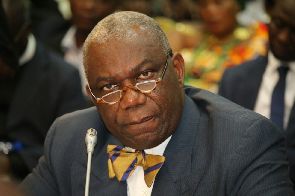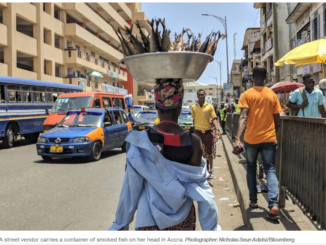Big international energy firms’ interest in Ghanaian upstream acreage bolsters hopes for the future
Mohammed Amin Adam, Ghana’s minister of energy in charge of petroleum, is confident that the country’s energy sector is on the brink of something big. He says the country can expand oil production from 180,000–-200,000bl/d now to 500,000bl/d within six years, and is targeting up to 1mn bl/d beyond that.
But getting there will need both established ones and new operators to follow through on exploration and production plans. And Adam knows that will not be easy in an increasingly competitive African marketplace. International oil companies’ spending may be rising, but still remains below pre-2014 oil price slide levels.
Ghana has built on the success of UK independent Tullow’s Jubilee field—discovered in 2007 and producing since December 2010—by adding output from two further fields, Tullow’s Ten and Eni’s Sankofa, since 2016. But exploration beyond core areas, as in most of the rest of Africa, came to a near halt during the price slump.
“If we want to sustain or increase production, we will have to be very aggressive in exploration,” Adam told Petroleum Economist at the Africa Oil Week conference in Cape Town.
Licensing round underway
To that end, Ghana launched in October its first licensing round, with a bid submission deadline of 21 May. Results are due to be announced in early July. A 23-person committee from various institutions will oversee the process—transparency is a key Ghanaian goal.
Blocks 2, 3 and 4 are up for competitive bidding, while the ultra-deep blocks 5 and 6 are on offer via direct negotiation — the traditional allocation method until now. The state-owned Ghana National Petroleum Corporation (GNPC) has secured a further shallow-water area, Block 1, where it is expected to bring onboard an experienced partner to boost its own technical capacity.
“The competitive bidding areas are not ultra-deep and nor are they shallow, and they are areas that have prospects,” Adam says, given existing seismic data and previously drilled wells. In these blocks, where water depths are less than 2,800m, “with competitive bidding you are likely to get the company that offers the highest value for the area”.
The ultra-deepwater blocks — both have maximum water depths over 4,600m — will see direct negotiations because of the specialised technical requirements. “These are deepwater areas where you do not have many prospects and you do not have much data. Not many companies can operate there, so you need to… match them against the risk,” says Adam. Effectively, only players with ultra-deepwater expertise and deep pockets are in play for those blocks.
Big guns out in force?
Energy ministry officials are eager to stress interest from the industry’s big guns, with China’s Cnooc, ExxonMobil, Total, BP, Shell, Eni, Tullow, US independent Kosmos and India’s ONGC all mentioned in dispatches. In contrast, smaller players and so-called “briefcase” firms are likely to be absent.
In the past, these types of companies have sat on speculatively acquired Ghanaian acreage, interested more in a higher price re-sale opportunity, rather than development. The government is now insisting on bids from firms with ready-to-roll work programmes, while also seeking to remove under-resourced idle tenants from existing acreage with a view to later re-licensing.
ExxonMobil agreed early this year to acquire the Deepwater Cape Three Points acreage—lying directly to the west of Block 3 in water depths up to 4,000m—following direct negotiations. The company has now brought state-owned Ghana Oil Company, commonly known as Goil, into the project with a 5pc stake, in addition to GNPC’s mandatory 15pc carried stake, as Ghana has introduced a new 5pc minimum requirement for a local private or state-owned partner, other than GNPC. Adam says he is confident that ExxonMobil’s entry into Ghana will produce “some good news”, given its ultra-deepwater exploration skillset.
All lined up
A ruling by the international tribunal for the law of the sea in September 2017, which resolved Ghana’s long-running maritime boundary dispute with Côte Cote D’Ivoire, has added to the positivity. The dispute had hampered full field development on the Ten field, which adjoins the border. Ghana and Côte Cote D’Ivoire are now prepared to work together to develop any discoveries straddling the boundary, says Adam.
Boosting production
Any discoveries in blocks on offer in the licensing round will be longer-term plays, so Ghana must find its near-term production gains elsewhere. Increased output through enhanced oil recovery techniques at producing fields and making it easier for better funded operators to farm-in and invest in production at existing yet-to-be developed exploration acreage will play roles, says Adam. But much new output must come from developments already in planning.
These projects will need to start progressing soon if Ghana’s production targets are to be realised, and Adam is optimistic. “In the short-to-medium term we can get to 500,000 b/d, largely from two additional fields,” he says.
Norway’s Aker Energy plans to submit a plan to develop the Pecan field in the Deepwater Tano Cape Three Points block in early 2019, after it completes appraisal drilling. The Maersk Viking drilling ship arrived in Ghana in late October to drill the Pecan-4A appraisal well in 2,600m of water. Assuming a timely final investment decision (FID), Aker sees production starting by early 2022. The company plans to use a floating production, storage and offtake (FPSO) facility to tap 2C resources estimated at more than 550mn bl, with peak production forecast to be around 125,000bl/d.
Aker has a stake in fellow Norwegian Petrica, which has an interest in the AGM field on the South Deepwater Tano block. The firm says this cross-holding should enable any AGM and Pecan discoveries to be developed in conjunction.
Petrochemicals hub ambitions
Further license rounds are mooted, as Ghana aims to move higher up the producers’ league table. But Adam says it has eyes not just on exports but also on meeting domestic demand and ensuring a diversified Ghanaian economy.
“We know that future oil demand for oil is going to be largely influenced by petrochemicals and we want to be to positioned for the opportunity that petrochemicals offer,” he adds. Petrochemicals will drive over a third of global oil demand growth by 2030, according to the International Energy Agency.
“We are able to refine crude both for Ghana and—as a tolling refiner—to refine other countries’ crude for onward export [to Ghana’s neighbours],” says Adam. The country already exports products to Burkina Faso, Togo, Côte d’Ivoire and others in its region.
At present, Ghana has one ageing state-owned refinery at Tema near Accra, which has a capacity of 45,000bl/d but has been operating well below nameplate for some time due to technical and funding issues. A “free zone” in western Ghana, close to existing oil and gas production, where incentives would be offered to develop refining and petrochemicals capacity, as well as related industries, is on the agenda.
The plan has yet to be fleshed out, with financing an obvious obstacle, but demand would seem to be there. Domestic refined products demand is forecast to total 3.7-3.9mn t in 2018, equivalent to 70,000-75,000bl/d, according to a Ghana Energy Commission report, putting it second in west Africa behind only Nigeria.
Adam believes Ghana’s established upstream track record, attractive licensing terms and political stability will woo investors. The task now will be to convert plans and good intentions into a serious expansion of the country’s oil and gas industry.
–
Source: petroleum-economist.com




